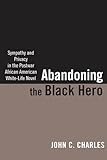Abandoning the Black Hero : Sympathy and Privacy in the Postwar African American White-Life Novel / John C. Charles.
Material type: TextSeries: The American Literatures InitiativePublisher: New Brunswick, NJ : Rutgers University Press, [2012]Copyright date: ©2012Description: 1 online resource (280 p.)Content type:
TextSeries: The American Literatures InitiativePublisher: New Brunswick, NJ : Rutgers University Press, [2012]Copyright date: ©2012Description: 1 online resource (280 p.)Content type: - 9780813554327
- 9780813554341
- PS374.N4 C47 2013
- PS374.N4 C47 2013
- online - DeGruyter
- Issued also in print.
| Item type | Current library | Call number | URL | Status | Notes | Barcode | |
|---|---|---|---|---|---|---|---|
 eBook
eBook
|
Biblioteca "Angelicum" Pont. Univ. S.Tommaso d'Aquino Nuvola online | online - DeGruyter (Browse shelf(Opens below)) | Online access | Not for loan (Accesso limitato) | Accesso per gli utenti autorizzati / Access for authorized users | (dgr)9780813554341 |
Browsing Biblioteca "Angelicum" Pont. Univ. S.Tommaso d'Aquino shelves, Shelving location: Nuvola online Close shelf browser (Hides shelf browser)

|

|

|

|

|

|

|
||
| online - DeGruyter Compassionate Confinement : A Year in the Life of Unit C / | online - DeGruyter Sustaining Cities : Urban Policies, Practices, and Perceptions / | online - DeGruyter Learning Race, Learning Place : Shaping Racial Identities and Ideas in African American Childhoods / | online - DeGruyter Abandoning the Black Hero : Sympathy and Privacy in the Postwar African American White-Life Novel / | online - DeGruyter Haskalah : The Romantic Movement in Judaism / | online - DeGruyter The Case That Never Dies : The Lindbergh Kidnapping / | online - DeGruyter Body Double : The Author Incarnate in the Cinema / |
restricted access online access with authorization star
http://purl.org/coar/access_right/c_16ec
Abandoning the Black Hero is the first book to examine the postwar African American white-life novel-novels with white protagonists written by African Americans. These fascinating works have been understudied despite having been written by such defining figures in the tradition as Richard Wright, Zora Neale Hurston, James Baldwin, Ann Petry, and Chester Himes, as well as lesser known but formerly best-selling authors Willard Motley and Frank Yerby. John C. Charles argues that these fictions have been overlooked because they deviate from two critical suppositions: that black literature is always about black life and that when it represents whiteness, it must attack white supremacy. The authors are, however, quite sympathetic in the treatment of their white protagonists, which Charles contends should be read not as a failure of racial pride but instead as a strategy for claiming creative freedom, expansive moral authority, and critical agency. In an era when "Negro writers" were expected to protest, their sympathetic treatment of white suffering grants these authors a degree of racial privacy previously unavailable to them. White writers, after all, have the privilege of racial privacy because they are never pressured to write only about white life. Charles reveals that the freedom to abandon the "Negro problem" encouraged these authors to explore a range of new genres and themes, generating a strikingly diverse body of novels that significantly revise our understanding of mid-twentieth-century black writing.
Issued also in print.
Mode of access: Internet via World Wide Web.
In English.
Description based on online resource; title from PDF title page (publisher's Web site, viewed 24. Mai 2022)


